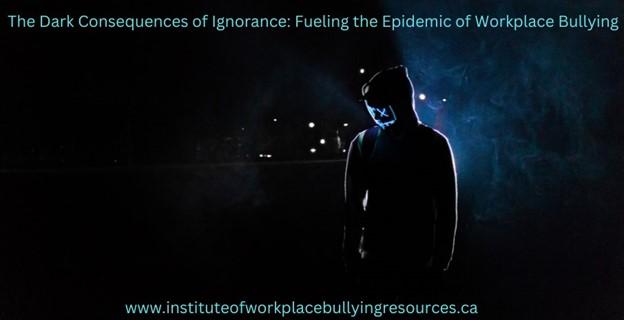Introduction
Ignorance can be a powerful catalyst in perpetuating the epidemic of workplace bullying, causing even more significant harm to those who become its targets. This abuse of power manifests in various forms, including emotional, physical, and psychological, with devastating consequences. Unfortunately, a lack of awareness, education, and understanding of the dynamics and nuances of this insidious problem often allows it to thrive. It is essential to explore how ignorance fuels workplace psychological hazards and exacerbates its devastating effects on individuals and society.
Misunderstanding the Nature of Abuse
One of the critical ways in which ignorance contributes to workplace bullying is by leading individuals to misunderstand the nature of abusive behavior. Many people erroneously equate workplace bullying with schoolyard bullying, overlooking the subtleties and complexities involved. The dynamics and nuances of workplace bullying are far more sophisticated than schoolyard bullying. After all, we are adults with years of education, life experiences, and developed skill sets; these misconceptions have deterred targeted employees from reaching out for qualified help and made it challenging for bystanders to recognize and intervene in such situations.
Victim-Blaming and the Cycle of Abuse
Ignorance often nurtures victim-blaming attitudes, wherein people unjustly assign blame to targeted workers for their abuse or accuse them of provoking their abusers. Such misconceptions stem from a lack of understanding of the intricate dynamics and power imbalances inherent in workplace abuse. Victim blaming perpetuates the cycle of workplace abuse, making it even more difficult for those targeted to escape their tormentors and seek the support they need.
Insensitive and Harmful Comments
Ignorance can lead individuals to make insensitive and harmful comments that further compound the suffering of targeted workers, such as:
“If you do not like your job, just leave!”
“You cannot blame someone for your unhappiness.”
“If you cannot take the heat, get out of the kitchen.”
“Don’t be so sensitive.”
“Why can’t you just ignore it like the rest of us?”
“Just stay under the radar; this is how they are.”
“If you rock the boat, you will deserve the wrath you get.”
Friends, family members, or colleagues may unintentionally (or intentionally) say things that dismiss or minimize the pain and trauma experienced by targeted workers. Workplace abuse is already “crazy-making,” and such comments only serve to isolate targeted workers further and discourage them from seeking support or reporting their abuse.
Inadequate Legal and Institutional Responses
A lack of awareness and education about workplace bullying can result in inadequate responses from institutions and the legal system. When authorities and institutions fail to recognize the signs of workplace abuse or mishandling cases due to ignorance, it leaves targeted individuals without the protection and justice they desperately need to heal and move forward.
The Continuation of Abusive Cycles
Ignorance perpetuates abusive cycles, often passing the effects down from one generation to the next. Children who bully others at school without facing consequences may grow up to become workplace bullies themselves. As they evolve their tactics, the damage inflicted can become severe. Breaking these cycles requires educating and raising awareness to help individuals recognize the harmful assumptions, myths, and stereotypes they may perpetuate.
Mandatory education and access to qualified resources can support those inclined to bully others, allowing them to make the necessary changes. Holding individuals accountable for their abusive behaviors is essential, ensuring they confront and change the destructive patterns they may have inherited. It is crucial to enlighten those who make harmful comments inadvertently supporting abuse rather than ethical behavior.
By adhering to legislation and company policies, offering respect, and creating a work environment that prioritizes psychological safety, we can actively work towards breaking the cycle of abuse and fostering a more compassionate and supportive workplace culture.
Ignorance is an easy problem to fix!
Conclusion
Ignorance, in its various forms, significantly contributes to the problem of workplace abuse. Whether it involves misunderstanding the tactics of workplace bullying, victim-blaming attitudes, or insensitive comments, ignorance amplifies the suffering of those who are targeted and allows workplace abusers to continue unchecked. To combat this pervasive issue, society must support the necessity of mandatory trauma-informed training on prevention and intervention and contribute to building awareness and empathy while fostering an environment where abuse is not tolerated and where those who are targeted actively receive support for healing and justice. Ending the cycle of workplace bullying starts with shining a light on the darkness of ignorance and illuminating the path to awareness, zero tolerance of abuse, support for recovery, and mandatory changes. It is imperative that trauma-informed training on prevention and intervention becomes mandatory to stop enabling abuse.
Addressing workplace bullying is like untangling a complex web, where gaining knowledge and eliminating unintentional harm through awareness is the key to unraveling the problem.
Linda Crockett MSW, RSW, SEP, CPPA
CEO and Founder
Consultant, Keynote, Facilitator/Trainer and Coach/Counsellor
Psychologicalsafetyfirst@gmail.com


